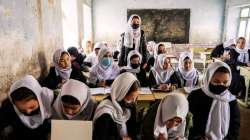Indonesia: Teacher tonsures at least 14 female students for not wearing hijab 'properly' in classroom
Notably, Indonesia banned wearing hijabs in school in 2021 but the activists claimed both Muslim and non-Muslim girls have been forced to wear the black headscarf in conservative regions of the archipelago.

In a shocking incident, a school teacher in Indonesia partially tonsured more than a dozen female students for not wearing hijab properly-- a black coloured headscarf, wrapped around the head and worn by Muslim women.
According to the reports, a teacher at state-owned junior high school SMPN 1 in the East Java town of Lamongan forced at least 14 Muslim students to shave their hair partially. The headmaster said that the school apologised to the students and their parents and added the teacher was sacked following the media reports.
Girls are forced to wear hijab: Activists
Notably, Indonesia banned wearing hijabs in school in 2021 but the activists claimed both Muslim and non-Muslim girls have been forced to wear the black headscarf in conservative regions of the archipelago.
However, the headmaster underscored that there was no compulsion for students to wear hijab on school premises. But, they were told to wear inner caps under their headscarves in order to look neat and clean.
It is worth mentioning in a similar incident in Iran, a 21-year-old Muslim woman, Mahasa Amini, was allegedly killed by "Moral Police" in custody for not wearing hijab properly on roads. This led to widespread protests in the country for months.
France bans abaya
Earlier on Sunday, the French education minister announced a major change in the dress code for school students, especially those Muslim girls who are wearing abaya, BBC reported. Notably, Abaya is an Arabic term for a long, loose outer garment. It is worn by both men and women. According to the minister Gabriel Attal, when a student enters into the classroom, her dress code should not exhibit religion. He said that the new rulings will be followed from September 4.
According to the report, the garment has been a popular dress code among Muslim girls but right-wing politicians have been voicing concerns saying it violates the fundamentals of secularism. On the other hand, the left parties claimed the decision could have a deep impact on the students.